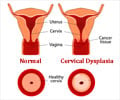
To determine the association between persistent HPV infections and cervical cancer risk in women over the age of thirty, Hui-Chi Chen, PhD, of the Genomics Research Center of Academia Sinica in Taipei, Taiwan, and colleagues, followed a cohort of 11,923 women aged 30 over a period of 16 years. The women underwent baseline exams that included HPV DNA testing and cytological tests, and the tests were repeated two years later. Incidence of cervical cancer was determinedfrom cancer registries and death registries. In total, 6,666 women participated in both baseline and second visits, whereas theother 3,456 patients underwent only the first exam.
The researchers found that the 16-year risk of cervical cancer was 6.2% for women infected with any carcinogenic strains ofthe virus. Among women who were persistently infected with carcinogenic HPVs over the 2-year testing period, cervical cancer risk was 12.4%, whereas the risk was only 0.14% for women who repeatedly tested HPV negative. Since the durationof infection, rather than one-time infection, predicts cervical cancer risk, the researchers said it would not be useful to repeat HPV testing more frequently than every two years for HPV-positive women.
The authors write, "Our findings suggest that, if upon testing an HPV infection is found, re-testing 2 years later would provide useful guidance as to the duration of infection and its risk." Furthermore, they say, "The accumulated evidence suggests that itis time to include HPV testing in cancer screening programs for the general population."
The researchers add that genotyping may improve HPV testing since certain carcinogenic HPV strains—namely HPV16 and HPV58—were associated with a higher risk of cervical cancer than others.
In an accompanying editorial, Kevin A. Ault, MD, of the Department of Gynecology and Obstetrics at Emory University School of Medicine notes that "persistent HPV infection is an intermediate step in the development of cervical cancer." He notes the study has several strengths, including long duration of follow-up, a large sample size, and linkage to the nationalcancer registry. He also adds that the study shows that women with negative HPV tests have a greatly reduced risk ofdeveloping cervical disease.
Advertisement















